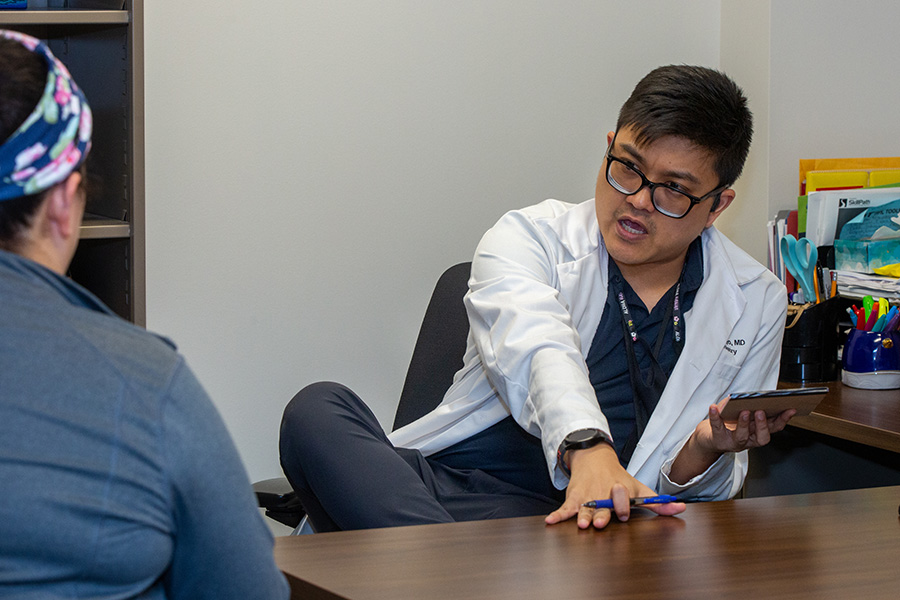Clinical Training

Our program is built on four key pillars: Wellness, Community, Subspecialty Clinical Experiences, and Experiential Learning in Psychotherapy. These pillars define our educational philosophy. Residents in our program will receive broad clinical training and solid didactics toward board preparation, while also gaining the ability to work effectively within various healthcare delivery systems. Additionally, they will develop the professional attitudes and behaviors necessary for success after completing their training.
The Department of Psychiatry actively works to sustain a welcoming and supportive environment for residents, acknowledging the challenges involved in training. The department aims to serve as a model for others through extensive recruitment efforts and community-building initiatives. Key engagement strategies include forming the SPARKS committee to promote resilience and support, outreach via social media, participating in events like the Heartland Pride Parade, mentorship programs, and professional development opportunities.
Residents will have ample opportunities to work with faculty with subspecialty expertise in Reproductive Psychiatry, Anxiety Disorders, Geriatric Psychiatry, Child and Adolescent Psychiatry, and other areas. Specialized clinics are led by several board-certified faculty members, most with fellowship training in areas of expertise. Residents will also have an immersive experience in Community and Rural Psychiatry, Addiction Psychiatry, ECT, and numerous elective opportunities.
Residents in our program will have direct experience in the powerful and disease-changing properties of evidence-based psychotherapy. During the first two years of training, residents receive psychotherapy didactics and conduct brief interventions with inpatient and consultation-liaison patients. Beginning in the second year, trainees will participate in psychotherapy groups focused on Cognitive Behavioral Therapy (CBT) and Dialectical Behavior Therapy (DBT) in individual and group settings. Residents will treat outpatients in therapy in the third year, with an option to take them into the fourth year for continuity and growth. Instruction and therapy supervision are provided by psychiatrists, psychologists, and master's-level therapists.
Expected Clinical Rotations
|
Inpatient pediatrics or Diabetes Endocrine and Metabolism (DEM) inpatient service |
1 month |
|
Emergency Medicine at Nebraska Medicine |
1 month |
|
Inpatient Internal Medicine at the VA |
2 months |
|
Inpatient Neurology at Nebraska Medicine |
2 months |
|
Emergency Psychiatry at Nebraska Medicine |
1 month |
|
Inpatient Psychiatry at the VA |
3 months |
|
Inpatient Psychiatry at Lasting Hope |
2 month |
|
Geriatric Psychiatry at Nebraska Medicine |
1 month |
|
Consultation-Liaison Psychiatry at Nebraska Medicine |
3 months |
|
Addiction Psychiatry at Nebraska Medicine |
2 months |
|
Forensic Psychiatry at Lincoln Regional Center |
1 month |
|
Rural Psychiatry at Great Plains |
1 month |
|
Treatment Resistant Depression/Child Psychiatry |
1 month |
|
Emergency Psychiatry Evenings Inpatient Psychiatry at Lasting Hope |
1 month |
|
Adult Outpatient Psychiatry at Nebraska Medicine |
2.5 days per week |
|
Adult Outpatient Psychiatry at the VA |
1 day per week |
|
Child and Adolescent Outpatient Psychiatry at Nebraska Medicine |
1 day per week |
|
Geriatric Psychiatry at Nebraska Medicine |
1 month |
|
Emergency Psychiatry at Nebraska Medicine |
1 month |
|
Electives at the VA |
2 months |
|
Consultation-Liaison Psychiatry at Nebraska Medicine |
1 month |
|
UNMC Electives at Nebraska Medicine |
4 months |
| Columbus Community Hospital | 2 months |
|
Forensic Psychiatry |
1 month |
Didactics schedule
General Psychiatry ResidencyOverall format: approximately 44 didactic days per year, 4 hours per day
|
Time |
Session |
|
12 p.m. - 1 p.m. |
Grand Rounds |
|
1 p.m. - 1:50 p.m. |
Didactic I |
|
2 p.m. - 2:50 p.m. |
Didactic II |
|
3 p.m. - 3:50 p.m. |
Didactic III or Journal Club or Case Conference |
|
4 p.m. - 4:30 p.m. |
Resident Meeting |